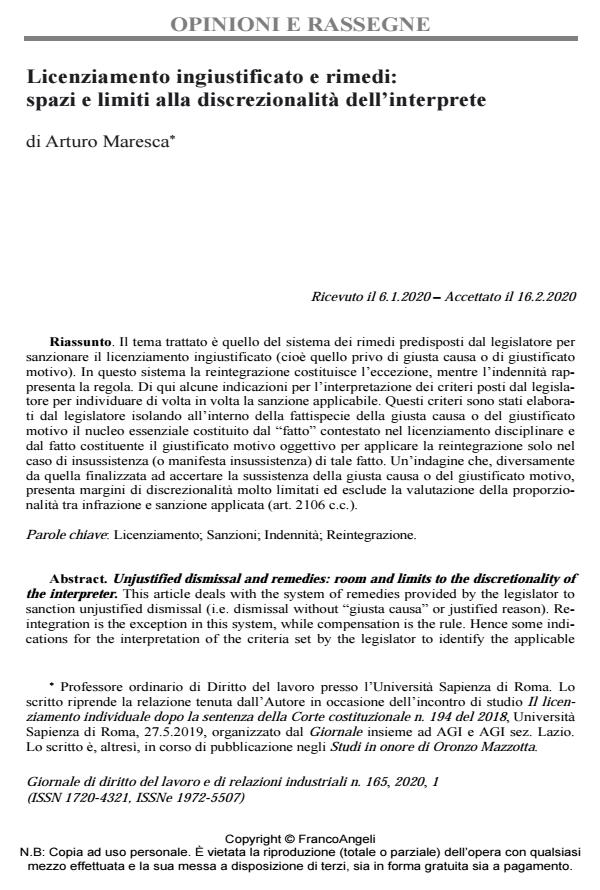Unjustified dismissal and remedies: room and limits to the discretionality of the interpreter.
Journal title GIORNALE DI DIRITTO DEL LAVORO E DI RELAZIONI INDUSTRIALI
Author/s Arturo Maresca
Publishing Year 2020 Issue 2020/165
Language Italian Pages 12 P. 103-114 File size 192 KB
DOI 10.3280/GDL2020-165005
DOI is like a bar code for intellectual property: to have more infomation
click here
Below, you can see the article first page
If you want to buy this article in PDF format, you can do it, following the instructions to buy download credits

FrancoAngeli is member of Publishers International Linking Association, Inc (PILA), a not-for-profit association which run the CrossRef service enabling links to and from online scholarly content.
This article deals with the system of remedies provided by the legislator to sanction unjustified dismissal (i.e. dismissal without "giusta causa" or justified reason). Reintegration is the excep-tion in this system, while compensation is the rule. Hence some indications for the interpreta-tion of the criteria set by the legislator to identify the applicable sanction on each occasion. These criteria have been elaborated by the legislator by isolating within the case of the "giusta causa" or the justified reason the essential nucleus constituted by the "fact" contested in the disciplinary dismissal and by the fact constituting the justified objective reason to apply rein-statement only in case of non-existence (or manifest absence) of this fact. A survey that, unlike the one aimed at ascertaining the existence of the "giusta causa" or justified reason, presents very limited margins of discretion and excludes the assessment of the proportionality between the infringement and the sanction applied (art. 2106 of the Italian civil code).
Keywords: Dismissal; Sanctions; Indemnity; Reinstatement.
- Repêchage e licenziamento per inadempimento di scarsa importanza: sul dopo Corte cost. n. 128 e n. 129 del 2024 Luca Nogler, in GIORNALE DI DIRITTO DEL LAVORO E DI RELAZIONI INDUSTRIALI 186/2025 pp.207
DOI: 10.3280/GDL2025-186001
Arturo Maresca, Licenziamento ingiustificato e rimedi: spazi e limiti alla discrezionalità dell’interprete in "GIORNALE DI DIRITTO DEL LAVORO E DI RELAZIONI INDUSTRIALI " 165/2020, pp 103-114, DOI: 10.3280/GDL2020-165005